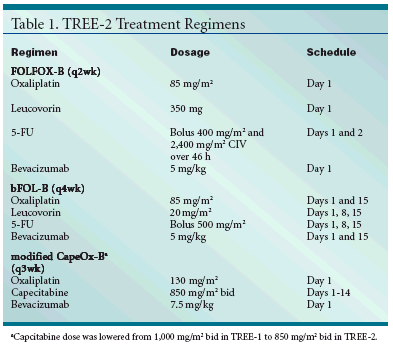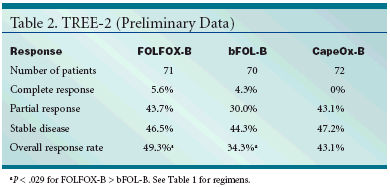Adding Bevacizumab Improves Response to Oxaliplatin Regimens
This special “annual highlights” supplement to Oncology News International (ONI)is a compilation of selected news on important advances in the management ofgastrointestinal cancers over the past year, as reported in ONI. Guest Editor, Dr.James L. Abbruzzese, comments on the reports included herein and discussesdevelopments in the clinical management of GI cancers, with a look at the impactof targeted agents with cytotoxic chemotherapy, first-line and adjuvant therapies foradvanced disease, and the role of statins and COX-2 inhibitors in prevention.
HOLLYWOOD, Florida-Preliminarydata from the TREE-2 randomizedstudy of first-line regimensfor metastatic colorectal cancer showthat bevacizumab (Avastin) can besafely added to oxaliplatin (Eloxatin)/fluoropyrimidine regimens and thatthe addition significantly improves responserates. Howard S. Hochster,MD, of New York University Schoolof Medicine, reported the early resultsof TREE-2 at the 2005 GastrointestinalCancers Symposium (abstract241).The TREE-2 study is a continuationof TREE-1, which is a randomizedphase II study of three oxaliplatin/fluoropyrimidines regimens (seeTable 1).After publication of studies showingthat adding bevacizumab improvessurvival of patients treated with irinotecan(Camptosar)/5-FU/LV (IFL) byabout 35% (N Engl J Med 350:2335-2342, 2004), the TREE-1 protocol wasamended in November 2003 to addbevacizumab to all three regimens."This randomized, multicenterstudy is the first to determine the safetyand tolerability of oxaliplatin/fluoropyrimidineregimens (bolus, infusional,and oral) in combination withbevacizumab for first-line treatmentof metastatic colorectal cancer," Dr.Hochster said.The study enrolled patients withmeasurable, untreated metastatic colorectalcancer and ECOG performancestatus of 1 or lower. The primary endpointwas incidence of grade 3-4 toxicitieson each arm during the first 12weeks of therapy.Dr. Hochster reported that 223 patientswere accrued between November2003 and March 2004 in TREE-2,of whom 213 were treated. He reportedtoxicity data for 71 patients treatedwith FOLFOX-bevacizumab (FOLFOX-B), 70 treated with bFOL-B, and72 treated with CapeOx-B. "Additionof bevacizumab to all regimens waswell tolerated, and no significant additivetoxicities were noted," he said.


Dr. Hochster noted that comparedwith TREE-1, CapeOx tolerability improvedon TREE-2 with a lower capecitabinedose of 850 mg/m2 twice daily(vs 1,000 mg/m2 twice daily on TREE-1), with no decrease in efficacy.Based on a preliminary analysis ofresponse data in the TREE-2 cohort,Dr. Hochster and his colleagues foundthat FOLFOX-B appears to be moreactive than bFOL-b, and that FOLFOX-B and CapeOx-B are approximatelyequivalent in efficacy (see Table2)